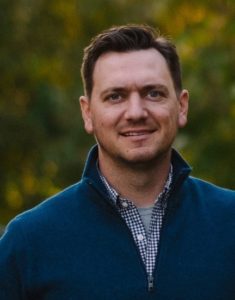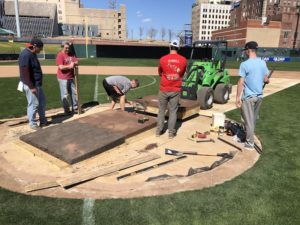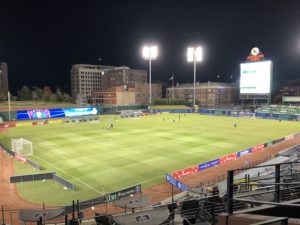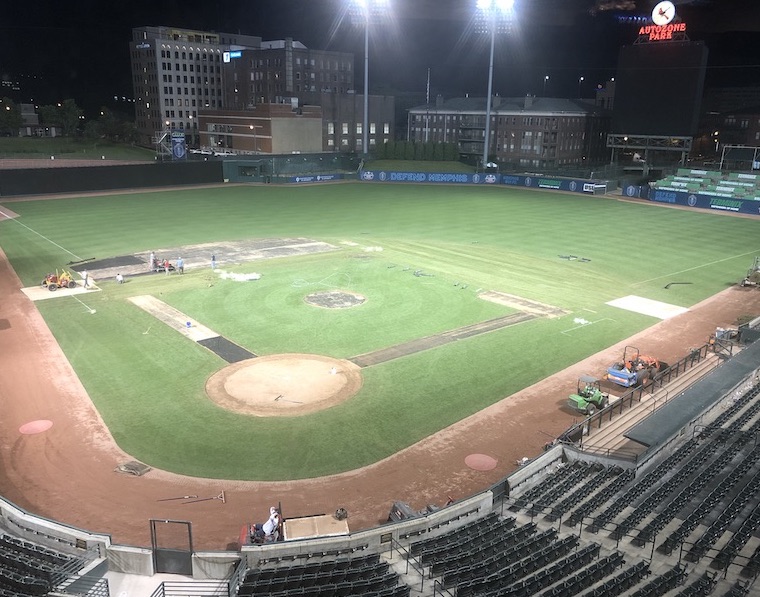In this edition of the SportsField Management Interview, we meet Brian Bowe, former director of field operations for the Memphis Redbirds.* The second of three brothers, Bowe grew up in Rolla, Mo., and graduated from the University of Missouri in 2009. He moved to Memphis in 2010 where he lives with his wife and two dogs. Bowe joined the Memphis Redbirds’ grounds staff as assistant groundskeeper in 2014 and held the role of director of field operations from 2018 until the end of 2020. He enjoys woodworking, hiking, cycling, drawing and cooking in his free time.
* Editor’s Note: The following interview was conducted in late 2020, while Bowe was still with the Memphis Redbirds.
SportsField Management (SFM): Please tell us about the fields/facilities you manage, and your staff/crew.

Bowe: AutoZone Park is a AAA baseball/USL soccer stadium in downtown Memphis, Tenn., that was built in 2000. The Redbirds, a St. Louis Cardinals affiliate, have called the stadium home since its completion. In 2019, Autozone Park became a dual-sport facility when the USL soccer club, Memphis 901FC, was created and began sharing the stadium. The playing field at Autozone Park consists of approximately 94,000 square feet of Northbridge bermudagrass.
The skinned areas are constructed with DuraEdge Professional infield mix, and, when converting the field into a soccer pitch, are completely covered with about 15,000 square feet of sod that includes a couple of sections of warning track as well.
In my time with the organization we have operated with two full-time groundskeepers and a group of about 15 to 20 seasonal grounds crew members.
Our team is responsible for maintaining the playing field, outside grounds and landscaping, performing the majority of the field conversion tasks, and overseeing any outside events that take place on the field.
SFM: What attracted you to the sports field management industry, and what was your path into the industry?
Bowe: I can remember being a young kid attending a St. Louis Cardinals game and thinking, “How cool would it be to come to work here every day?” – at that time mainly just thinking about the vendors walking through the stands. It wasn’t until college that I learned that sports field management could be a viable career. I had decided to transfer to the University of Missouri following my sophomore year. My plan was to enroll in the Plant Sciences department and study Landscape Design. It wasn’t until my orientation that summer that I learned of the Turfgrass Management program and immediately switched my concentration area. During my time at Mizzou, I was fortunate enough to get an internship with the athletic department working mainly on the baseball and softball fields during the school year. I also spent my summers working with faculty and grad students maintaining turfgrass research plots at the university’s South Farm facility. After graduation, I spent some time working for a landscaping company before leaving the green industry to pursue an opportunity in Memphis to work with a non-profit construction company. While I enjoyed the work I was doing and the mission of the organization, I never lost my interest in the turf industry. After four years in construction, I decided to try to get back into sports field management. As luck would have it, a couple of days into my search, I discovered that the Redbirds were looking for an assistant groundskeeper. I joined the Redbirds for the 2014 season, and my very first day had the pleasure of working an exhibition game between the club and their Major League affiliate, the Cardinals. I served in the role of assistant groundskeeper for four and a half seasons before being promoted to director of field operations in June of 2018 – a role that I will bittersweetly be vacating at the end of 2020 to pursue other opportunities.
SFM: What would you say are the biggest accomplishments of your career and/or what are you most proud to have achieved?

Bowe: There are small things that I think we all take great pride in; getting the slope and table top of a mound perfectly dialed in, admiring a freshly edged infield, overhearing a fan comment on a unique mowing pattern, or having a player tell you the infield is playing perfectly. The thing I’m most proud of, though, is completing our inaugural season of hosting both professional baseball and professional soccer. As an increasing number of my colleagues are aware, the toll of a dual-sport field is high. Not only do the two sport seasons overlap 100 percent, but the time spent converting the field significantly eats into your already limited time to perform necessary cultural practices or to even take a rest. My assistant, my crew, and I spent more than our share of overnights and weekends at the stadium preparing for the next event and often racing to beat an unfavorable forecast. The days were long, the deadlines were tight, and the field wasn’t always perfect; but by the end of the season, we could look back and be incredibly proud of what we had accomplished. With the field a little worse for wear following the end of the baseball regular season, the decision was made to completely re-sod the field in a two-week window before playing host to the AAA National Championship Game and finishing out the few remaining soccer matches. This last big push allowed us to finish out the season on a high note by showcasing the field on national TV, and establishing a great playing surface going into the offseason. While the accomplishments on the field are notable, I’m most proud of my team and how they rose to the challenge.
Many of our grounds crew members have other jobs or are in school, and still chose to work very late into the night/early morning, or come in extra days to help get the job done. They did it all with great attitudes and incredible work ethic. Without them and their dedication, we would not have come close to accomplishing our goals.
SFM: What are the biggest challenges you have faced in your career, and what advice do you have for other sports field managers when it comes to facing similar challenges?

Bowe: Some of the biggest challenges I’ve faced in my time in Minor League Baseball are work/life balance and stress. I’ve missed some big events in the lives of family and friends, such as weddings and milestone birthdays, but the little things, like missing dinner at home with the family, add up as well. My advice to others facing these challenges is to make sure you advocate for yourself. It can be cathartic to vent shared struggles together with other field managers, but no one else is going to make your struggles known to those in management above you. My hope is that your concerns are heard, and that real efforts are made to help you address those issues – but nothing can be done until you speak up for yourself. We all knew about the long days and nights and weekends when we got into this industry.
To a certain degree those things are inevitable, but with the trend of adding more and more events and ever-increasing expectations, you’re the person who best knows what you need to accomplish what is being asked of you. I also think that counseling/therapy can be an incredibly useful tool for a groundskeeper. With therapy becoming more and more culturally acceptable, I believe that finding an hour every couple of weeks to see a therapist will pay mental dividends to anyone willing to invest the time and effort.
SFM: Who were your mentors in the industry, and/or what is the best advice you received during your career?
Bowe: I’ve met some really great people in the industry going all the way back to my time at Mizzou. Dr. Brad Fresenburg not only hired me to work summers with him at the university research farm, but was also crucial in helping me get an internship with the athletic department where I worked my final two years of college. Brad is laid back and full of knowledge, always willing to help out in any way that he could. Similarly, Jerry Cummings of the Universtity of Missouri athletic department offered tutelage and encouragement early on in my journey.
Jerry is someone I’ve been able to turn to with questions throughout my career, and long after I had left Columbia still sends holiday and birthday messages. The person I had the opportunity to work with the longest was Ben Young, who was brought in to be head groundskeeper for the Redbirds in 2015. I learned a lot from Ben, especially in terms of managing a team. He was incredibly patient and always took the time to teach others.
SFM: How has your career benefitted from being a member of national STMA?
Bowe: STMA has given me the opportunity to meet, network and build relationships with other sports field managers around the country and at all levels of play. Without the STMA, it would have been difficult to get to know so many of my peers and those who have been in this industry much longer and are all incredibly willing to lend advice, a helping hand and encouragement. Most of my closest friends in the industry have come from chance meetings at an STMA event.
Additionally, the education sessions and trade shows at national STMA conferences have helped keep me up to date on new ideas, technology and tools around the industry – many of which I’ve used on my own field.
SFM: How do you think the profession and industry will change in the next 10 years, and/or what would you most like to see in terms of industry advancement in the future?
Bowe: I’m hopeful that the professional profile of sports field managers rises to meet the continually increasing expectations and expertise required to be successful in our industry. I believe this is already happening at the highest levels of professional sports, and even at some universities; but we have incredibly talented, hardworking, and innovative field managers working in parks and rec, high schools, and minor league sports where expectations on these professionals are often increasing at a higher rate than their resources.


